Role of ESAs in Treating Psychological Disorders
Psychological disorders are not only exhaustive to the affected person but also those who surround him/her. It is also important to note that each mental illness comes with its unique side effects. But you shouldn’t worry about this as there are solutions to most of these effects.
One of the best-known medicines for most psychological disorders is Emotional Support Animals. These companions will help you navigate through your mental instabilities, enabling you to recover faster.
So, have you thought of having an Emotional Support Animal (ESA), but you aren’t quite sure yet about how the whole situation plays out? Well, we have created a detailed guide to help you on what to do to get an emotional support animal.
If you really need a stable solution for your mental health problems- Click below to get your ESA Letter!
Here is a list of psychological disorders. We have simplified everything into 7 chapters, starting from the most basic to the complex ones.
Table of Contents
Chapter One: Understanding Emotional Support Animals in Relations to Other Service Animals
You are probably wondering what emotional support animals are? Or you may have seen people walking around with animals and wondering if they could be emotional support animals.
Well, to put it merely, emotional support animals (ESAs) are animals like pets that provide emotional support to humans. In most cases, these animals help them manage their mental instabilities.
We will discuss in later chapters all the mental conditions that are considered as impairment. Besides this, we will also look at how to find an emotional support animal.
Unfortunately, many people often assume that emotional support animals need to have to go through some specialized training to provide the right support. That is not the case at all. It is your everyday friendly pet. The fact that they don’t require any specialized training makes emotional support animals even more appealing.
So, How Do You Contrast between ESAs and Other Service Animals?
To help you understand how ESAs are different from other animals, perhaps we should look at different service animals that help humans manage physical and mental issues.
- Service Animals
- Therapy Animals
- Emotional Support Animals
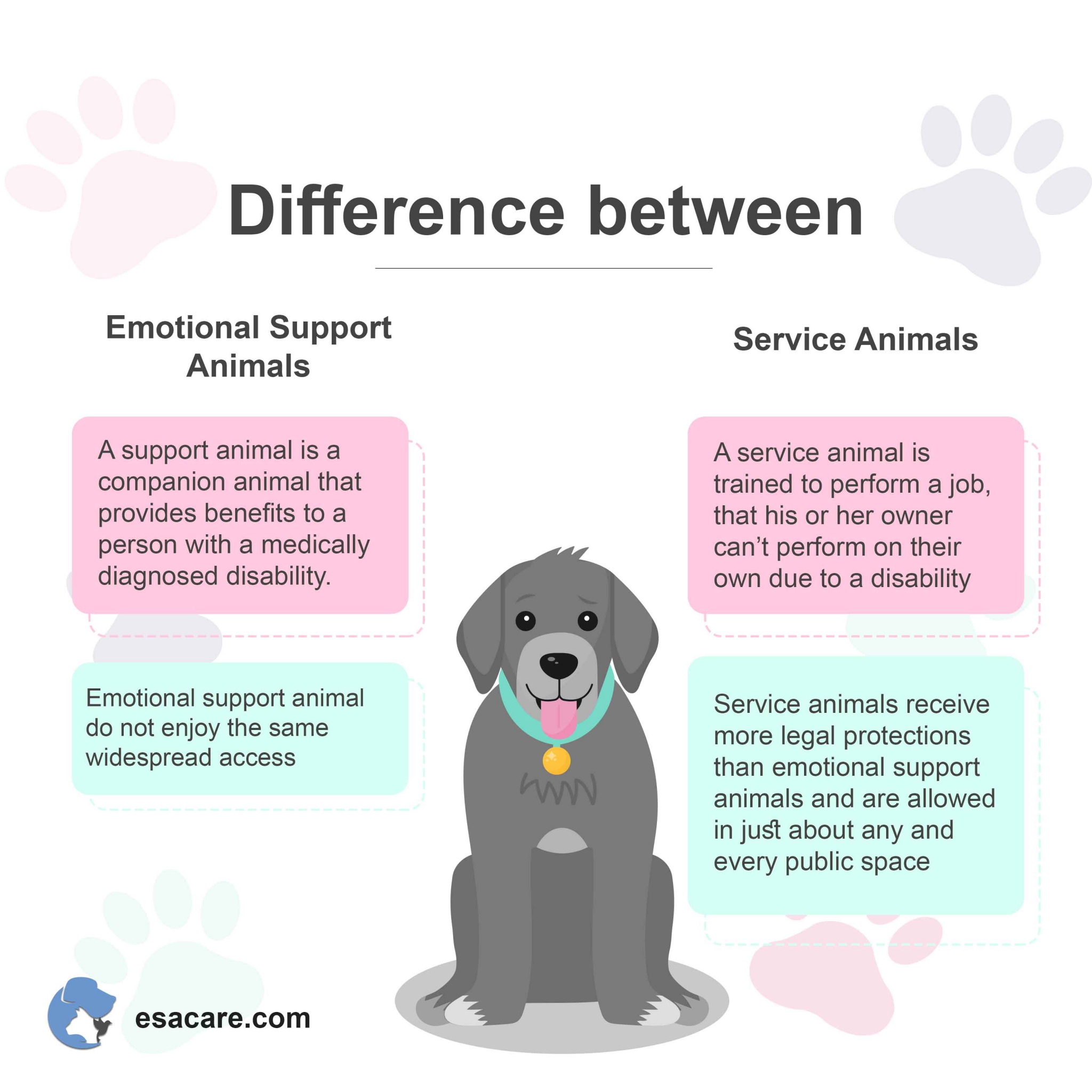
Contrast between Emotional support dog and service dog
Service Animals
Service animals are species that are well trained to help a person with physical and mental impairment carry out some minor tasks – for instance, helping a blind person in their normal daily activities. Because of this, they accompany their owners wherever they go.
Therapy Animals
These are animals that provide therapeutic support to an individual or group of people struggling with stressful situations. You are more likely to find these animals in nursing homes, therapy centers, and even hospitals. Sometimes, they may accompany healthcare professionals to their therapy sessions.
To be considered as therapy animals for an organization, they must meet the following conditions:
- The animal should not feed on raw meat.
- The animal should have lived with the owner for at least 6 months.
- The animal should be vaccinated.
- Therapy animals should be trained to handle people.
Emotional Support Animal
These are animals that provide support to persons with mental disorders. The main difference with the above type of support animals is that ESAs don’t need any specialized training to provide help. Another thing is that they can live with their owners, even in residences that prohibit animals. What is interesting is that these animals have special rights of their own. We will discuss this topic in the upcoming chapters.
So, ESAs differ from other animals because of the kind of support they offer; they help people manage several mental health issues, which we will cover in the next chapter.
Suffering from mental illnesses? Get your ESA letter for the treatment of psychological disorders!
Chapter Two: How Emotional Support Animals Help Humans Manage Their Mental Health Issues
Some people with mental health illnesses are not aware that emotional support animals can help them manage their problems. These animals are often referred to as assisting animals. The value they provide to people with mental issues is immense. Each day, you will find people narrating their stories about how emotional support animals have had a significant impact on their lives.
To be precise, emotional support, animals can help you manage psychological disorders in these ways:
They Stimulate the Production of Your Natural Antidepressant
If you have had to deal with a mental issue like depression, then you know that they are often accompanied by periods of sadness. So, your ESA can help you in the release of natural antidepressants to manage the situation.
You see, people with underlying psychological issues tend to have less than normal levels of dopamine and serotonin. In some cases, they have none. Besides these two hormones, there is also norepinephrine, a stress hormone that needs to be regulated all the time. All these hormones play a crucial role in regulating important functions:
- Serotonin: This hormone is responsible for controlling your mood.
- Dopamine: It is the hormone that determines your level of happiness.
- Norepinephrine: While it is a stress hormone, it is responsible for controlling several functions such as increasing the blood flow rate in skeletal muscles, and increasing the health rate.
Since serotonin is responsible for your moods, you can approximate its level based on your feelings. If you constantly feel down, then that could indicate a low level of serotonin. That will trigger sadness and depression.
The same can be said about the other hormones. At least now you know how natural antidepressants work in your body. Sadly, under depressive situations, it might not work in the normal way.
So, emotional support animals can come in to reduce your depression. These animals will always try to cheer you up when they notice you are all gloomy. In other words, they can sense your emotions and provide support accordingly. When you are sad, they will snuggle and cuddle you. All these adorable gestures of your companions are like magic. They will help to calm you down.
In a relaxed state, your mind will be stimulated to release more serotonin and dopamine, making you happier and normal.
They Are a Confidence Booster
Whenever you are facing it rough, you tend to be more conscious of yourself. This may inhibit you from carrying out daily activities. You tend to be paranoid even when people are not watching what you are doing.
Because of this mental state of affairs, you will most likely feel less confident. The situation tends to get worse when you are in a crowd.
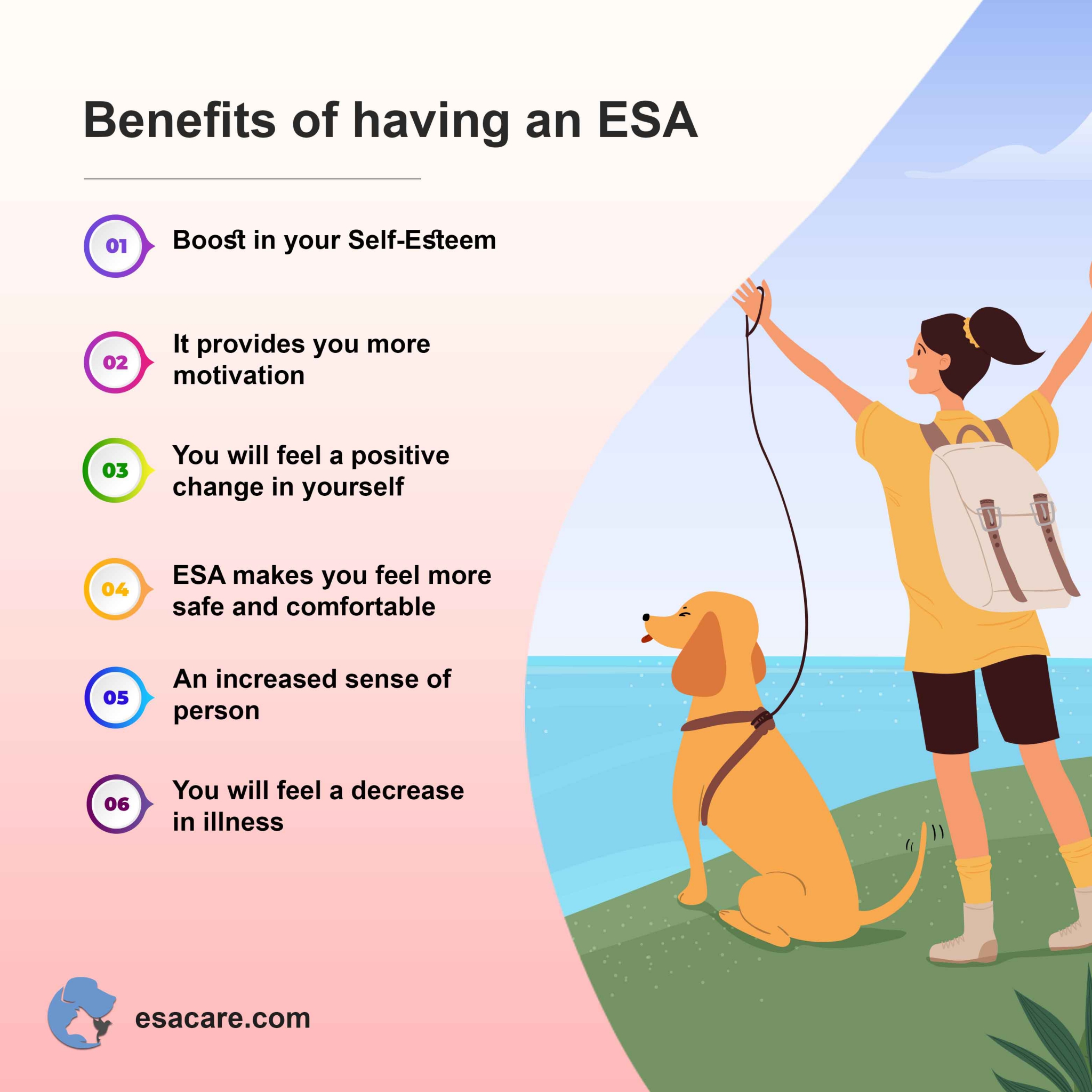
Benefits Of an ESA
You might be tempted to return home. And if you stay, you will avoid making eye contact. Such mental stress will make one withdraw from people. The main reason is that you are surrounded by negative feelings, which might affect your perception of things. What is even worse is that it will make you feel sad.
Thankfully, there is a companion that will provide the much-required solution. Your emotional support animals will not only make you feel good, but it will also motivate you to leave your comfort zone. As you know, coming out of your comfort zone sometimes requires a bit of an effort. So, you need a boost from your ESA to do this.
The fact that these animals love nature means that they are always looking to go out. This will in turn force you to get out of your home. They will not take no for an answer.
Whenever they feel like going out, they will start jumping around or pawing at you. They won’t stop giving these gestures until you give in and accompany them outside.
The good thing is that once you are outside, it will be easier to interact with other people. When you talk to other people, you will start regaining your confidence. To say the least, you will become more confident when you stay with your ESA.
Get Your ESA Letter, and live every moment of life!
ESAs Help You Overcome Your Fears
If you tend to be fearful around people, then your ESA will help you fight these fears. Here, we are referring to normal fears that we all face such as getting nervous when on the driver’s seat for the first time, falling down the stairs, or even feeling frightened during a flight with turbulence.
Most of these fears usually vanish immediately when the situation passes. Unfortunately, some fears will make you feel irrational for no reason. For instance, avoid accepting jobs outside your house because you are afraid of driving or refusing to go on a trip because it means flying. These are the kind of fears that your ESA can help you fight them.
From the above example, you can clearly identify that all of them have one thing in common. They will prevent you from doing your normal job. In short, this amounts to phobia. If you are struggling with a phobia, then you will most likely resonate with these situations.
If you didn’t know, phobias are mental health issues, too. The bad thing with phobias is that it prevents you from carrying out your daily activities. You will spend most of the time handling negative thoughts, which might not be good for your mental health.
When mental issues become a hindrance, then emotional support animals can be your ray of hope. They will help you get out of that misery.
But you may ask, how? Well, phobias will rob you of your daily joy, which will affect your life in a big way. When you come across a seemingly frightening situation, your hands might turn cold, but your companion will be your side. So, you will recover easily and get over the fear. In other words, your ESA will act as security by your side to help you navigate fearful situations. Hopefully, you will overcome the fears completely and start a new life.
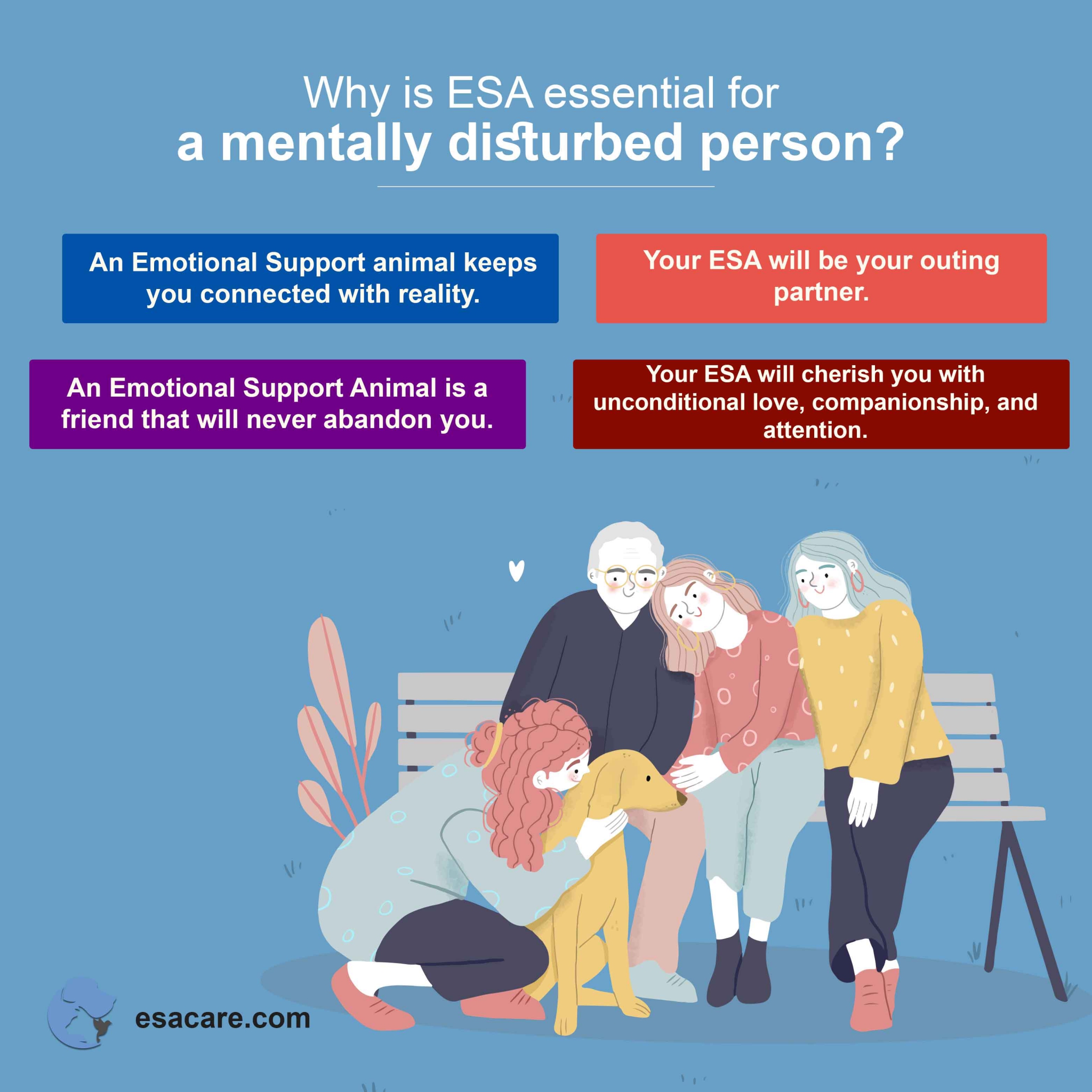
Why ESA is important for mentally disturbed person
They Are a Source of Emotional Strength
The thing with mental disorders is that they not only affect your mentality, but they also affect your emotional wellbeing. Mental stability is closely tied to your emotions.
That is why so many people struggling with depression often have mood swings. Their minds can be easily overwhelmed by a negative situation, thus throwing their emotions in different directions. For example, they may get angry at you for no apparent reason. Sometimes, they may even have rapid outbursts of mixed feelings or feel low all the time.
If these things are weighing you down, you won’t have to worry anymore because you have an emotional support animal by your side. Having an ESA will help you stabilize your emotions. The thing is ESAs are generally attentive listeners, so when you are going through rough times, you can pour out your heart to these animals.
They will care for you and give you attention whenever you need it. In the process, ESAs will help you get a grip on your messy situation. By showering you with love, they will help you come out of despair faster.
Chapter Three: What Makes You Eligible to Get an ESA?
As discussed earlier, people with mental issues can qualify for an ESA. Even if you have depression or anxiety you might not be eligible for ESA. These are just symptoms of mental health problems and a definite diagnosis by a mental health professional is necessary for an ESA recommendation. With that said, there are several mental health conditions that can make you eligible to use an emotional support animal. These are just a few of many mental health issues, even anxiety, and depression:
- Social phobia
- Dyslexia
- Autism
- Panic Disorder
- PTSD
- Bipolar Disorder
- ADHD
- Mood Disorder
- Schizophrenia
- Insomnia Disorder
Here are the main causes of mental health:
Infections: Some infections may cause damages in your brain, thus leading to mental health issues. Some of the infections may be from childhood while others develop in adulthood.
Heredity: Just like other illnesses, mental disorders could occur because of the mutation of genes. These mutated cells will be passed down the generations. And that is why you may find members of the same family suffering from a certain mental disorder.
Prenatal damage: If a fetus is injured in the brain while in the womb or during delivery, that may trigger a mental disorder.
Nutrition: Poor nutrition is to blame for several health conditions, mental disorders included. You see, the brain needs nutrients to develop and perform normal functions. So, when the brain lacks some of the key nutrients, you may have issues in the way you think or feel.
Substance abuse: Substance abuse such as alcohol or drug abuse may cause several mental problems such as depressions, anxiety, and paranoia.

How to Get an ESA Letter
Key signs of mental health problems:
- Confusion
- Anger
- Social Withdrawal
- Change in appetite
- Aggression
- Excessive stress
- Hallucinations
- Long term irritability
- Interrupted sleeping pattern
- Difficulty in making decisions
- Suicidal thoughts
So, if you have been diagnosed with any of the above listed mental issues, then you are a candidate for emotional support. Likewise, if you are suspecting that you are suffering from a mental condition, then you should consult a mental health professional. In a later chapter, we will discuss what you should do to get an emotional support animal.
Get an authentic ESA Letter!
Chapter Four: The Benefit of Having an Emotional Support Animal
Emotional support animals use various techniques to calm down people with different mental illnesses. Their friendly nature makes them a healthy companion to any person.
Let’s discuss the various benefits that you get from having an emotional support animal.
They Help You Fight Depression
Depression is a common issue nowadays. It is associated with several mental disorders. The problem with depression is that it drives people nuts. It makes you feel negative about nearly everything. Not only does it drain you of all your energy, but it also takes away the motivation to do things. If this situation continues for a long time, a person will likely feel lonely.
One of the major manifestations of depression is that the affected individual tends to withdraw from people and activities that he/she once liked. Apart from this, chronic depression can also trigger a number of critical illnesses such as hypertension, diabetes, and cardiovascular diseases, among others.
So, when you introduce emotional support animals into the picture, they will sense how you are feeling and try to brighten your mood. They are good listeners, so you can pour your heart out to them. This alone will calm your nerves down and bring a sense of relief when you are distressed. These animals will also hug or paw at you, which melt away any sadness. These warm gestures from your emotional support animals will trigger your brain to release endorphins.
They Reduce Anxiety
Besides depression, anxiety is another issue that can make one nervous. There is a difference between the normal nervousness, which is okay, and nervousness that interferes with your daily life. Feeling nervous before an interview, nervousness while talking in the public for the first time, or being timid while doing a presentation is normal.
But if you get nervous while doing normal daily chores, then that is a red flag you shouldn’t ignore. This kind of anxiety will get on your mind. You might start having thoughts like “I shouldn’t proceed with a task because I always get it wrong” or asking yourself: Am I even doing it the right way?
But when you have an emotional support animal by your side, you will be less likely to feel anxious in normal situations. Grab Your ESA Letter Now!
Emotional Support Animals Can Help You Manage PTSD
Post-traumatic stress disorder is a mental health problem that occurs as a result of past traumatic events. Sure, everyone has their own traumas in life, but PTSD is going beyond the obvious. If not attended on time, it can cause hallucinations and other forms of delusions.
Perhaps this example will paint a clear picture of this condition. If an individual experiences a negative event in the past like getting stuck in the elevator or a robbery, these events may get embedded in their memory and start haunting them. Current events relating to those past traumatic experiences may also trigger negative episodes.

Benefits of an ESA Letter
For instance, if a person was kidnapped when he/she was a child, this individual will likely get traumatized if he/she hears of someone being kidnapped. Let’s say the kidnappers were wearing masks and black clothes. So, whenever such individuals see people in masks or black clothes, they will experience traumatic episodes such as a panic attack.
These episodes are usually accompanied by different symptoms as listed below:
Avoidance Symptoms
A person suffering from PTSD might start avoiding the things or persons that will likely remind them or trigger the traumatic events.
Re-experiencing Symptoms
As the name suggests, an affected individual may start reliving the negative events once again. This could happen in the form of negative thoughts, traumatic dreams, and flashbacks.
Reactivity Symptoms
These symptoms often occur as a result of past traumatic events. The symptoms vary across the board. In some cases, it might interfere with people’s lives. For instance, they can make one easily scared, aggressive, or cause sleep deprivation.
Cognitive Symptoms
These symptoms will influence the habits or thoughts of a person struggling with PTSD. They can include loss of interest in things, depressive thoughts, and being forgetful.
How Emotional Support Animals Help Tackle Mental Disorders
Dealing with PTSD can be a real challenge. Your negative episodes can be triggered anytime without warning. For this reason, you may avoid going in public or talking to strangers for fear of being attacked. This vulnerability can be subdued with the help of an ESA. With your ESA by your side, you will feel secure and that will help you overcome the trauma.
Are you also suffering from strange psychological disorders? Click the button below to improve your quality of life!
Chapter Five: Which Animals Fall Into the Category of Emotional Support Animals
A lot of people often have the wrong notion of what Emotional Support Animals are. They often assume that cats and dogs are the only emotional support animals.
In real sense, several animals can qualify as emotional support animals. You see, the main purpose of ESAs is to provide mental peace and give you attention. Your mind is the main control of your body, as the brain sends different signals to different parts of the body simultaneously.
So, when there is impairment in your mind, your body will likely suffer. Your emotions too will be affected.
For example, one of the critical functions of your brain is to control the productions of hormones. So, if your brain fails to coordinate the release of important hormones, then you will experience challenges with your metabolism, thinking, and even living a normal life.
The worse thing is that overproduction or low growth of hormones can cause several diseases in both children and adults. So, a sound mind is critical to living a normal life. Sadly, people with mental disorders may not have a sound mind. That is why ESAs are required to help stimulate their brains to work normally. Common ESAs can include:
Dogs
Dogs are generally known to be man’s best friends, so they are definitely one of the most effective ESAs. They are warm, joyful, and active. These traits will stabilize a person struggling with mental issues. We have discussed at length about the effectiveness of dogs as ESAs in one of our blog posts.
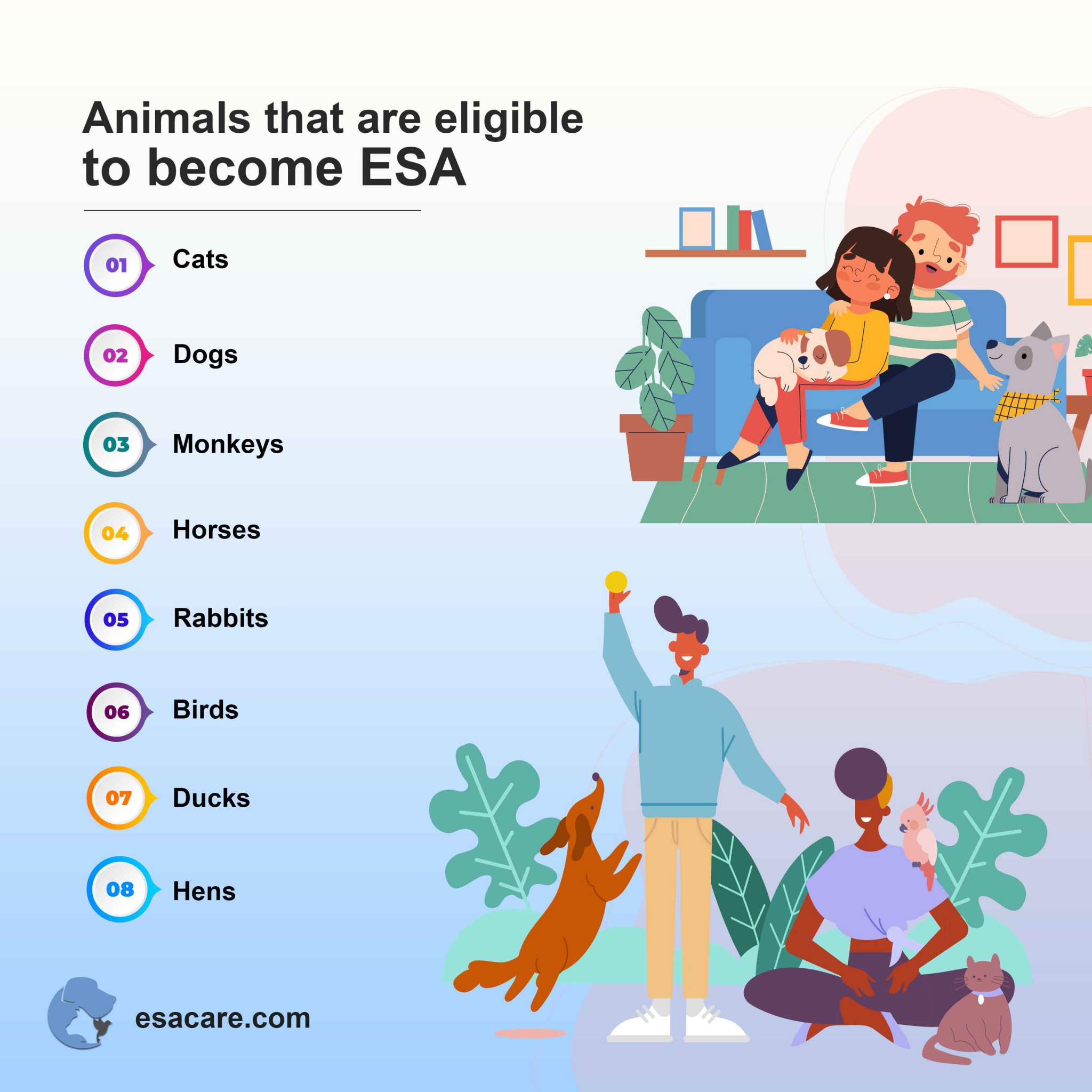
ESA Pets
Cats
Just like dogs, cats can also provide a calmness to anyone suffering from mental health problems. These animals can rub or massage their cheeks against you. They love to mark things as their territory. So, they will also mark humans as their own. When your cat rubs their body against you, it will create a soothing sensation, which will help calm your nerves.
Monkeys
You might be wondering why monkeys. Well, these animals not only share some characteristics as human beings, but they are also friendly and cute. These intelligent creatures are quite complex and can provide friendly companionship. They are not only useful in providing emotional support, but they can also support people with physical health issues.
Rabbits
Spending time with rabbits often ignites childhood memories. Likewise, spending time with a bunny will also help you manage your mental health condition. They are caring, adorable, and sometimes playful. This helps calm your mind so that you can think straight.
Birds
Birds? Yes, that is right. Certain types of birds can provide emotional companionship. You can improve your mood with a talking or chirping bird. After all, they are small, cute, and easy to keep.
Spending time with these birds can suppress your mental health issues. Their merrier nature will push you to maintain a steady journey towards full recovery.
Horses
Some of you might think that it is weird to have a horse as an ESA. Horses can be great emotional support animals when you befriend them. But you will need a spacious house to accommodate them. Apart from keeping you safe, these animals can also help you in other ways. According to the British Horse Society, there is so much benefit in just riding a horse. It relieves you of anxiety and depression. So, you can imagine the kind of benefits you will get when you have your own emotional support horse.
Chapter Six: What to Do to Get an Emotional Support Animal
There are several steps that you need to take to get an emotional support animal. The first step is to get an ESA letter, which will serve as a legal permit. It will also help you to secure the rights of your ESA. But you should note that you shouldn’t register your animal as an ESA. Actually, there is no law that requires you to register animals for support. So, if anyone claims that they can issue you with a registration certificate for your ESA, then that is surely a scam.

Fake Esa Letters
Once you have your ESA letter, you are good to go. If you are planning on having an emotional support animal, please follow the steps below:
Step 1: Check for Hints
Before you adopt or register your pet as an ESA, look for signs that could indicate that you are indeed suffering from a mental disorder. But note that we are not referring to temporary signs that vanish after an event. Normal fears you experience while going for a test, job interview or presentation cannot be used to gauge your mental stability. Emotional roller coasters and anxiety are also normal because they usually occur just for a given moment.
But if these symptoms last for over 6 months, then you have to go for a medical examination. Common symptoms of mental health issues include:
- Changes in dietary habits
- Feeling sad
- Being paranoid
- Extreme fear
- Insomnia
- Social isolation and detachment from activities
- Sudden outbursts of aggression
- Excessive mood swings
Step 2: Fill Out Relevant Forms
Once you have established that you are suffering from a mental health condition, you can then look for formal documents. Visit an Emotional Support Animal letter provider either in person or online. They will give you a questionnaire where you will provide basic information about your animal and yourself. The provider may also ask you about your medical history.
After that, you will choose a package that suits your needs. These packages come at different prices, so you will also have to consider your budget. Get Your ESA Letter !
Step 3: Schedule an Appointment
Once you have chosen the right package, then you can make an appointment. All of this can be done online.
The good thing is that you can schedule an appointment with the LMHP according to your availability.
Step 4: Talk to the LMHP
When the appointment date arrives to make sure to discuss everything with your LMHP. Discuss your condition in detail, including all the signs and symptoms. This will enable the LMHP to get a full picture of your condition and recommend the right solutions.
Based on this discussion, the LMHP may request for further tests. These tests include:
Lab Tests: Your LHMP may recommend that you undergo a blood test to find out underlying pathology.
Psychological Tests: In this case, the LHMP will ask you some questions to understand your emotions, reactions, and activities.
Please note that not all patients are recommended for these tests.
Based on your test results, the LHMP will recommend that you get an ESA. To formalize this, he/she will give you an ESA letter. In most cases, you will get the soft copy there and then. After a few days, the hard copy will be sent to your doorstep.
So what are you waiting for? Get your ESA letter by clicking the button below!
Chapter Seven: What You May Not Know About Emotional Support Animals
There are several things that are rarely mentioned when it comes to ESAs. But you don’t’ have to worry anymore, as we have discussed them below:
Rights of an ESA
Just like humans, emotional support animals have rights, too. The American Disability Act (ADA) has stipulated various rights of these animals. Here are the main policies that ADA has issued.
- The landlord doesn’t have a right to request information regarding your medical condition or your ESA.
- There are no restrictions regarding the age or the breed of the emotional support animal.
There is No Extra Fee to Get or Keep an ESA
If you have been paying an extra fee for your ESA, you should know that you don’t have to do that. If someone tries to charge you to keep you ESA, just show them the ESA letter. On top of this, you can inform them that your ESA is not required to pay any extra fees.
ESAs Don’t Need Special Training
Some people may be misled into thinking that their ESA should undergo some special training. Your animal doesn’t have to be trained to provide the necessary support. Emotional support doesn’t need special skills. What matters is emotional attachment and companionship.
You Can Travel With Your Emotional Support Animal
Lastly, you are allowed to fly anywhere with your emotional support companion. That means that you can fly with the animal onboard. In most cases, pets are transported as cargo. So, if you are planning on a trip or visiting your relatives, then you can carry your ESA with you.
Are you also suffering from rare psychological disorders? Get your ESA letter today!
Conclusion
We have covered a lot already. In this guidebook, we discussed the role of emotional support animals in your journey to your recovery from mental health issues. Besides this, we also looked at the different types of animals that qualify as ESA and the steps of obtaining an ESA letter. We also touched on key signs and symptoms of psychological disorders to help you understand whether or not you need an ESA.
Finally, we highlighted various facts about emotional support animals that are rarely discussed. For instance, you don’t have to pay extra charges to keep your ESA. So, if you are seriously struggling with mental health issues, get help right away. Do not ignore the subtle signs. An ESA will help you navigate the traumatic situations.








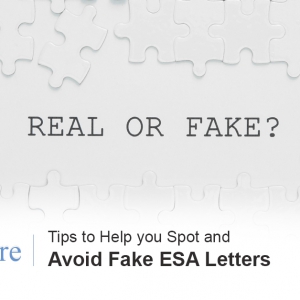

 347 5th Ave Suite 1402-112,
347 5th Ave Suite 1402-112,

Leave a Reply
Want to join the discussion?Feel free to contribute!